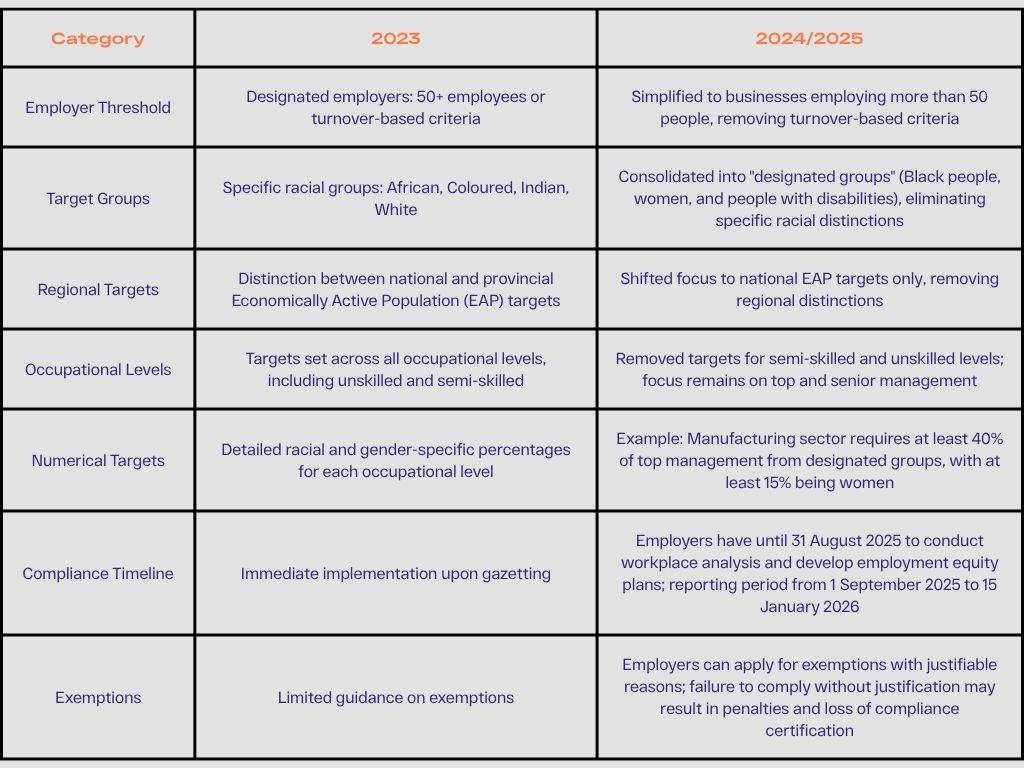If you’re a South African business owner, HR professional, or just trying to stay on top of local compliance requirements, the new BBBEE regulations that come into effect in 2025 are something you can’t afford to ignore.
Most Important Key Takeaways:
- Only companies with over 50 employees are now required to comply—turnover no longer applies.
- Employment equity targets are now based on national demographics, not provincial.
- Focus is on senior management transformation—semi- and unskilled targets removed.
- Sector-specific targets introduced, e.g. manufacturing must have 40% top management from designated groups.
- Non-compliance risks losing your Employment Equity Certificate—impacting tenders and contracts.

In a major move to accelerate workplace transformation, South Africa’s Department of Employment and Labour has introduced updates to the Broad-Based Black Economic Empowerment (B-BBEE) framework through the Employment Equity Amendment Act (EEAA). These changes aim to simplify compliance while driving real impact in terms of representation and equality in the workplace.
In this blog post, we’ll unpack what’s changed, what it means for your business, and what you need to do to stay compliant.
What’s Changing in the New BBBEE Regulations?
Let’s take a closer look at the key updates introduced under the new 2024/2025 BBBEE regulations:
1. Who Needs to Comply?
Previously, designated employers were defined based on the number of employees or the company’s turnover. Under the new BBBEE regulations, only businesses employing more than 50 people will be classified as designated employers—regardless of their revenue. This change simplifies the criteria and removes uncertainty for small businesses.
2. Shifting to National Target
Historically, employment equity targets were adjusted based on regional or provincial demographics. But from 2025, all targets will be based on national Economically Active Population (EAP) demographics. This streamlining ensures consistency across all provinces and reduces administrative confusion.
3. Occupational Levels Refocus
Another big change is that targets for semi-skilled and unskilled occupational levels have been removed. The focus now lies on top and senior management, where transformation is still lagging behind. Businesses must now be more intentional about who they place in leadership roles.
4. Simplified Designated Group
Previously, companies had to report on employment equity progress by race and gender in great detail. The updated regulations now consolidate these groups into “designated groups”, which includes Black people, women, and people with disabilities. This reduces the complexity of planning and reporting while still ensuring inclusivity.
5. Industry-Specific Targets Introduced
For the first time, the government is rolling out sector-specific numerical targets. For instance, in the manufacturing sector, at least 40% of top management must be from designated groups, with at least 15% being women. These targets are tailored per industry and will guide transformation in a more focused manner.
6. New Legal Sector Code & Automotive Transformation Fund
The Legal Sector Code, effective from 20 September 2024, introduces its own transformation requirements for law firms and advocates. Meanwhile, automotive companies can opt into the Automotive Industry Transformation Fund (AITF) by contributing 2.75% of turnover over ten years as an alternative compliance route.
Deadlines and Reporting Periods
Here are the key compliance dates to diarise:
- By 31 August 2025: All designated employers must complete a workplace analysis and develop an employment equity plan.
- 1 September 2025 to 15 January 2026: Employment equity reports must be submitted.
Failing to meet these deadlines without a valid reason could mean losing your Employment Equity Compliance Certificate, which is required to do business with government entities.
What Happens If You Don’t Comply
Businesses that do not meet their sectoral targets—and cannot justify the shortfall—may:
- Be denied the employment equity compliance certificate
- Face fines and other penalties
- Risk exclusion from state tenders and supply chain opportunities
That’s why it’s critical to start preparing now, especially if your business employs over 50 people.
Transformation
The new BBBEE regulations are not just about ticking boxes. They’re a renewed call to businesses across South Africa to genuinely drive inclusion. By promoting equity in leadership and providing opportunities to underrepresented groups, we build stronger companies and a more just society.
As business owners, this is a chance to rethink how we hire, promote, and create opportunity—not because we’re forced to, but because it’s the right thing to do.
Final Thoughts
The 2025 BBBEE regulations are a bold step forward for transformation in South Africa. While they may seem complex at first glance, they also offer a clearer and more structured path for companies to follow. If you start preparing now, you’ll not only avoid penalties—you’ll also build a more inclusive and resilient business for the future.
Need help navigating your B-BBEE strategy? Consider partnering with transformation consultants or employment equity advisors to build a compliant, inclusive plan.
📌 Sources
- BusinessTech. Noose tightening for businesses in South Africa – https://businesstech.co.za/news/business/813269
- ABizQ. Understanding the 2024 Sectoral Targets – https://www.abizq.co.za/understanding-the-2024-sectoral-targets/
- SERR Synergy. Business Edge – Legal Sector Code – https://serr.co.za/monthly-newsletter/business-edge-october-2024
- Elevate Advisory. Automotive Code blog post – https://www.elevateadvisory.co.za/blog


